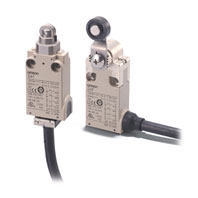Small Safety Limit Switch
D4F
 Ultra-Small Safety Limit Switch
Ultra-Small Safety Limit Switch
Standards and EC Directives
Conforms to the following EC Directives:
• Machinery Directive
• Low Voltage Directive
• EN50047
• EN60204-1
• EN ISO 14119
• GS-ET-15
Certified Standards
|
Certification body |
Standards |
File No. |
|
TÜV SÜD |
EN60947-5-1 |
*1 |
|
UL *2 |
UL508 |
E76675 |
|
CQC (CCC) *3 |
GB/T14048.5 |
*1 |
1. Contact your OMRON sales representative.
2. Certification has been obtained for CSA C22.2 No. 14 under UL.
3. Ask your OMRON representative for information on certified models.
Certified Standard Ratings
TÜV (EN60947-5-1), CCC (GB/T14048.5)
|
Item |
AC-15 |
DC-13 |
|
Rated operating current (Ie) |
0.75 A |
0.27 A |
|
Rated operating voltage (Ue) |
240 V |
250 V |
Note: Use a 10 A fuse type gI or gG that conforms to IEC60269 as a short-circuit protection device.
UL/CSA (UL508, CSA C22.2 No. 14)
C300
|
Rated voltage |
Carry current |
Current (A) |
Volt-amperes (VA) |
||
|
Make |
Break |
Make |
Break |
||
|
120 VAC |
2.5 A |
15 |
1.5 |
1,800 |
180 |
Q300
|
Rated voltage |
Carry current |
Current (A) |
Volt-amperes (VA) |
||
|
Make |
Break |
Make |
Break |
||
|
125 VDC |
2.5 A |
0.55 |
0.55 |
69 |
69 |
Characteristics
|
Degree of protection *1 |
IP67 (EN60947-5-1) |
|
|
Durability *2 |
Mechanical |
10,000,000 times min. |
|
Electrical |
1,000,000 times min. (4 mA resistive load at 24 VDC, 4 circuits) |
|
|
Operating speed |
1 mm/s to 0.5 m/s |
|
|
Operating frequency |
Mechanical |
120 operations/minute |
|
Electrical |
30 operations/minute |
|
|
Contact resistance *5 |
300 mΩ max. (with 1 m cable), 500 mΩ max. (with 3 m cable), 700 m Ωmax. (with 5 m |
|
|
Minimum applicable load *4 |
4 mA resistive load at 24 VDC, 4 circuits (N-level reference value) |
|
|
Rated insulation voltage (Ui) |
250 V |
|
|
Rated frequency |
50/60 Hz |
|
|
Protection against electric shock |
Class I (with a ground wire) |
|
|
Pollution degree (operating environment) |
3 (EN60947-5-1) |
|
|
Impulse withstand |
Between terminals |
2.5 kV |
|
Between terminals |
4 kV |
|
|
Between each |
4 kV |
|
|
Insulation resistance |
100 MΩ min. (at 500 VDC) between terminals of the same polarities, between terminals |
|
|
Contact gap |
2 × 2 mm min. |
|
|
Vibration resistance |
Malfunction |
10 to 55 Hz, 0.75 mm single amplitude |
|
Shock resistance |
Destruction |
1,000 m/s2 min. |
|
Malfunction |
300 m/s2 min. |
|
|
Conditional short-circuit current |
100 A (EN60947-5-1) |
|
|
Conventional free air thermal current (Ith) |
2.5 A (EN60947-5-1) |
|
|
Ambient operating temperature |
- 30 to 70°C (with no icing) |
|
|
Ambient operating humidity |
95% max. |
|
|
Cable |
UL2464 No. 22 AWG, finishing O.D.: 8.3 mm |
|
|
Weight |
Approx. 190 g (D4F-102-1R, with 1 m cable) |
|
Note: 1. The above values are initial values.
2. Once the contact is opened or closed with an ordinary load, it cannot be used for a load smaller than that. The contact surface may be rough, which impairs the reliability of contacting.
1. The degree of protection shown above is based on the test method specified in EN60947-5-1. Be sure to confirm in advance the sealing performance under the actual operating environment and conditions.
2. Durability values are calculated at an operating temperature of 5 to 35°C, and an operating humidity of 40% to 70%. Contact your OMRON sales representative for more detailed information on other operating environments.
3. Do not apply 1 A at 125 VAC to more than two circuits.
4. The value will vary depending on factors such as the switching frequency, the ambient environment, and the reliability level. Be sure to confirm correct operation with the actual load before application.
5. The contact resistance was measured with 0.1 A at 5 to 8 VDC with a fall-of-potential method.




